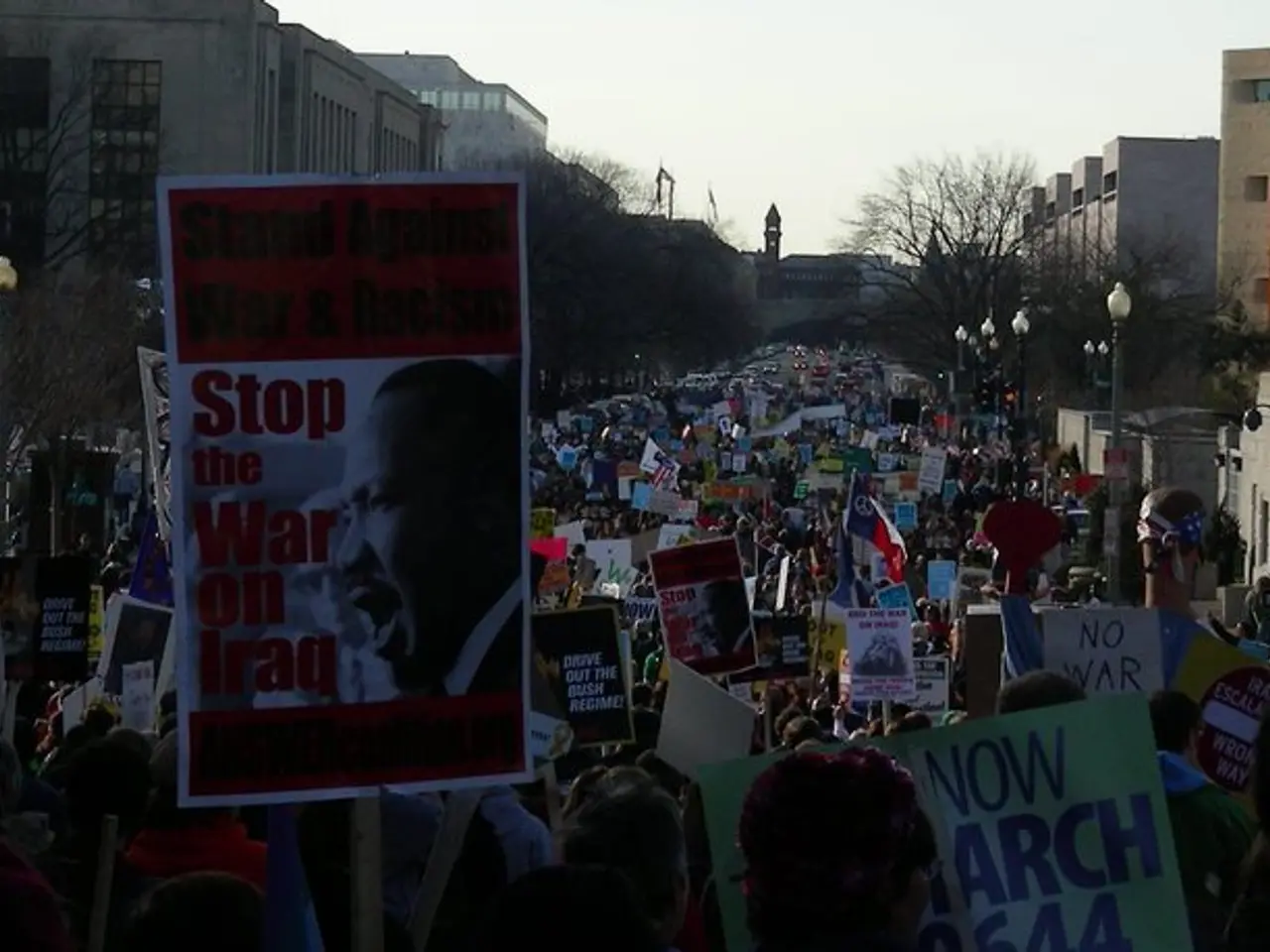Anarchic Rant: Unshackling the Tigers of Critical Theory
What is Critical Theory?
Crucial Perspectives: The Influence of Critical Theory on Political Ideas and Belief Systems
Critical Theory is essentially a periscope, enabling us to peek behind our cocooned society towards the power structures that lurk beneath. By ferreting out these hidden propellers, it attempts to engineer a change, seeking to dissolve the injustices and inequalities that hold us down. Originated mainly by the Frankfurt School as a cocktail of Marxist ideology and Freudian psychoanalysis, it has since evolved into a multi-faceted approach, scrutinizing social norms and valuing social change above all else.
The core vision of Critical Theory is to ignite the spark of freedom—a liberty untethered from the shackles of domination and oppression embedded within social institutions and cultural norms. This radical introspection permeates into varied fields, such as economics, culture, politics, and psychology, striving to cast light on society’s darkest corners. Detractors may dismiss it as being overtly pessimistic, but to those who seek genuine social transformation, it is a beacon of hope.
Historical Development of Critical Theory
Critical Theory grew from the roots of the Frankfurt School in the early 20th century. This pioneering think tank advanced a holistic approach, synthesizing philosophy, sociology, psychology, and cultural criticism to dissect the systemic roots of social problems. The key players in this evolution—Theodor Adorno, Max Horkheimer, Herbert Marcuse, Walter Benjamin, and Erich Fromm—drew inspiration from the minds of Karl Marx and Sigmund Freud.
These pioneers were not kneeling before the altar of tradition; instead, they were audacious skeptics questioning the status quo. In response to the fascist tide sweeping across Europe, many of them were forced to immigrate, relocating mainly to the United States. This shift westward allowed for the adaptation of Critical Theory to the divergent socio-political context of the mid-20th century, fostering new dimensions of critique targeting less obvious social injustices through the media, technology, and other capitalist systems.
Key Theorists and Their Contributions
Some of the towering intellectuals who have defined Critical Theory and amplified the multifarious aspects of this perspective include:
- Max Horkheimer: As a key founding figure, he played a pivotal role in framing this approach and emphasized the importance of interdisciplinarity and self-reflective, critical analysis.
- Theodor Adorno: Riding the crest of his synergy with Horkheimer, he contributed significantly to the development of the concept of the “culture industry," which delves into the mass deception perpetrated by mainstream culture and the media.
- Herbert Marcuse: A prominent figure in the 1960's and '70s, he expanded its relevance by critically exploring the impact of advanced, industrial societies on individualism and the role of marginalized groups in actively working towards systemic transformation.
- Jürgen Habermas: Known for his introduction of concepts like the public sphere, deliberative democracy, and discourse ethics, he advanced Critical Theory beyond its Marxist roots and shifted the focus to communicative action.
- Walter Benjamin: Originally less affiliated with the Frankfurt School, his ideas about the aestheticization of politics and the age of mechanical reproduction still impact cultural criticism and the study of media, art, and literature today.
Each of these theorists has pushed boundaries and provided unique lenses to explore the labyrinthine complexities of power, politics, and culture.
Principles of Critical Theory in Political Thought
At its core, the principles that guide Critical Theory in political thought center on dismantling societal structures, advocating for social justice, and pushing for transformative change. Let us break down the key ideas that irk the status quo:
- Social Justice and Emancipation: Critical Theory is unapologetically driven by the desire to liberate disadvantaged groups from oppressive social milieus, exposing underlying forces that breed inequalities and work doggedly to address them.
- Critique of Ideology: A burrowing investigation into the philosophical foundations and socio-cultural influences that shape human beliefs and behaviors, the goal here is to expose the often well-concealed interests that manipulate and control social dynamics.
- Interdisciplinary Methodology: Swimming in diverse disciplines, such as sociology, psychology, economics, and anthropology, Critical Theory strives to broaden understanding by integrating a kaleidoscope of perspectives.
- Historical Context: Positioning contemporary issues in their historical context is essential, as this approach enables us to trace the development of problems, unmask their deep roots, and challenge the perceived inevitability of the status quo.
- Reflexivity: Pervasive self-scrutiny and objectivity are critical aspects that demand critical intellectuals to assess their biases and examine their perspectives with a keen eye.
- Praxis: A synthesis of theory and practice, Critical Theory champions the meaningful application of critical insights into real-world experiences, transforming ideas into actionable solutions designed to effect societal change.
The Chicanery of Modern Society
Critical Theory does not possess blinders when scrutinizing society, and its all-encompassing analysis targets economic, political, and cultural facets to expose the hidden mechanisms that enslave and oppress. Let us dissect several fundamental aspects of this critique:
- Capitalism Exposed: Drawing attention to the impact of capitalism on societal structures and human relationships, Critical Theory openly indicts its reductive form of rationality, which prioritizes profit and efficiency over human needs and the environment.
- The Culture Industry: The Frankfurt School's exploration into the manipulation of the masses by mainstream culture and the media resonates especially today as we struggle to separate truth from agendas.
- Authority and Control: Power operates through various mediums, such as the state, educational institutions, and the media, and its propagation of dominant ideologies often nurtures conformity and perpetuates exploitation and exclusion.
- Technology and Surveillance: Although technology can be a boon, Critical Theory unearths its sinister side when deployed for purposes of surveillance and control.
- Environmental Degradation: The ecological crises afflicting our planet today are attributable, at least in part, to our capitalist society's unsustainable exploitation of natural resources.
- Consumerism and False Needs: Run headlong into the religions of Consumerism and Capitalism, and you will find suffering and delusion—everything is distorted by capitalist society's manipulation of human desires to shackle individuals to the system for its own benefit.
The piercing analysis of modern society that Critical Theory offers is designed to incite a revolutionary spirit, inspiring us to challenge, dismantle, and reconstruct the system to serve human needs more sincerely.
Impact of Critical Theory on Contemporary Politics
Critical Theory has significantly influenced the political landscape across the globe, seeping into academic discourse, public policies, and social movements through its incisive critiques and thought-provoking insights. Let us examine how this approach has shaped the world:
- Influencing Political Ideologies and Movements: By advocating for social justice and the systematic dismantling of oppressive structures, Critical Theory has inspired and educated a myriad of leftist and progressive political ideologies and movements.
- Shaping Public Policy: By identifying the interconnections between economic systems and social outcomes, Critical Theory provides a theoretical foundation for policies geared towards addressing social problems more comprehensively.
- Impact on Academic Discourse: Critical Theory informs the interrogation of established narratives, promoting more critical, self-reflective scholarship that factors in the role of power dynamics, ideology, and systemic imbalances.
- Advocacy for Marginalized Communities: By exposing the hidden mechanisms that marginalize certain groups, Critical Theory equips advocates with strategies and tools to advocate for the rights and interests of vulnerable communities.
- Democratic Participation: Critical Theory champions the principle of participatory democracy, encouraging individuals to engage with political processes and question the legitimacy of dominant narratives and power structures.
Debates and Criticisms of Critical Theory
Although the influence of Critical Theory is indisputable, it has faced its fair share of skepticism and criticism from various quarters. Here is some of the common criticisms levied against Critical Theory:
- Perceived Pessimism and Cynicism: Critics question whether Critical Theory's unbridled pessimism about societal transformation dissuades meaningful action, fostering an undesirable sense of hopelessness.
- Excessive Complexity: The dense, jargon-heavy language and complex theoretical frameworks of Critical Theory can sometimes be inaccessible to the layperson, limiting its broader impact and potential for real-world change.
- Overemphasis on Power and Domination: Critics argue that Critical Theory's focus on power and domination may oversimplify human relationships and underestimate the role of cooperation and mutual aid in shaping society.
- Lack of Clear Solutions: Where Critical Theory excels at identifying problems, critics assert that it falters when suggesting constructive solutions or alternatives, leaving the field open to bickering and stagnation.
- Ideological Bias: Some criticize that Critical Theory is inherently Marxist, which in turn introduces an ideological slant that distorts its analysis and conclusions.
- Impact on Academic and Cultural Discourses: Critics contend that Critical Theory's emphasis on subjectivity and relativism threatens universal truth and scientific objectivity, potentially undermining their value in promoting scholarly consensus and progress.
In the face of these debates and criticisms, Critical Theory's advocate stands firm, arguing that the approach is dynamic and evolves organically in response to new global challenges and shifts in societal consciousness.
Critical Theory in the Digital Age
Digital technologies have reshaped society, and Critical Theory's analytical lens has shifted to accommodate these changes. Let us explore how Critical Theory has adapted to the digital landscape:
- Digital Media and the Culture Industry: Building upon the critique of the Frankfurt School's culture industry, Critical Theory investigates how digital platforms perpetuate similar patterns of mass consumption, passive reception, and manipulation.
- Surveillance and Data Privacy: In the era of Big Data, Critical Theory's focus has grown to encompass concerns about individual privacy rights, raising alarms about the dangerous merger of data collection, analysis, and surveillance.
- Impact on Democracy and Political Participation: Critical Theory scrutinizes the influence of digital technologies on democratic processes and political participation, assessing their potential to bolster or undermine engagement in public discourse.
- Ethical Considerations: With the advent and advancement of Artificial Intelligence, Critical Theorists have begun to question its impact on power dynamics and ethics, advocating for greater transparency and accountability.
Future Directions for Critical Theory
Looking forward, Critical Theory is poised for continued evolution to adapt to the challenges and opportunities of the contemporary world. Here are some possible paths for the approach:
- A Stronger Global Focus: Increasingly, Critical Theory aims to expand its purview beyond the Eurocentric focus, incorporating a more global perspective that includes the experiences and issues of the Global South.
- Heightened Emphasis on Intersectionality and Diversity: The approach is progressively acknowledging the interconnected nature of social categorizations as they impact different individuals and communities, offering a more comprehensive understanding of social inequalities and power dynamics.
- Technology Critiques and Proposals: With the speed of technological advancement, Critical Theory is destined to steer its analytical prowess to the study of emerging technologies and their potential implications for society.
- Environment and Ecological Justice: The ecological crises spiraling across the globe highlight the urgent need for Critical Theory to investigate and address the connections between capitalism, environmental degradation, and social inequality.
- Renewed Commitment to Praxis: Critical Theory has always championed actionable strategies for societal change, and this focus will likely intensify as the world grapples with global problems requiring collective, radical action.
As Critical Theory evolves and adapts, it will continue to serve as a guiding light, urging us to challenge the status quo and demands us to strive for a truly just and inclusive society.
Below are two sentences that contain the given words and follow from the text:
- Changes in the political landscape have been influenced by the insights of Critical Theory, leading to the evolution of social movements advocating for social justice and the dismantling of oppressive structures.
- Engaging with the complexities of the contemporary world, Critical Theory delves into news stories in various fields, including politics, to shed light onsystemic inequalities and promote general-news discussions about facilitating genuine social transformation.




